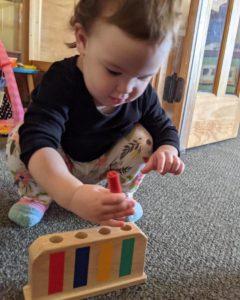 Is Montessori the right type of program for your infant? If this is your first experience with an early learning and care setting, take a look at what you need to know about infant development, the first steps towards your child’s education, and the Montessori philosophy.
Is Montessori the right type of program for your infant? If this is your first experience with an early learning and care setting, take a look at what you need to know about infant development, the first steps towards your child’s education, and the Montessori philosophy.
What Are Montessori Infant Programs Called?
Montessori education features its own vocabulary. Preschoolers ages three through six are grouped into the Montessori Children’s House — or casa dei bambini. An infant isn’t old enough to participate in the Children’s House early learning environment, but they can still go to a Montessori school. Infants attend the Montessori Nido, which is Italian for nest. However, not all Montessori schools use this terminology.
Do Montessori Infant Programs Provide Child Care?
Montessori programs aren’t all equal or the same. Some programs provide Monday through Friday full-day child care. Other programs offer an education-focused curriculum on a part-time (partial week and partial day) basis.
If you work full-time or you need full-day child care, ask the school if they provide this type of service before you enroll your infant. Whether you choose a full- or part-time program for your infant, all high-quality Montessori classrooms are caring, supportive environments.
As an educational philosophy, Montessori education focuses on helping young children to build independence and exploratory skills. But this doesn’t mean your infant is left to fend for themselves in the classroom. Instead, the educator will care for your child and provide the guidance they need to succeed.
What Do Infants Do in Montessori Programs?
There’s no universal answer to this question. The specific program or school will create a curriculum for teachers to follow with different age groups. Even though you may find some differences between Montessori schools, the overall themes, materials, and guiding principles should follow the philosophy.
Like other types of early learning environments, Montessori programs help infants and young children to build skills across the developmental domains — social, emotional, cognitive, and physical (including fine and gross motor skills). The Montessori infant classroom will also include a variety of curricular content that can help the youngest of learners to explore literacy, the arts, science, and more.
How Do Infants Learn in Montessori Programs?
Montessori education includes a sensory-filled approach to learning in a child-guided way. This type of philosophy is ideal for young children. Your infant won’t sit passively and listen to a teacher talk at them. Instead of this traditional type of approach, your child will interact with specialized Montessori materials in a hands-on way. This means your infant will take the lead and construct their own early educational experience.
While older Montessori students are given more freedom to explore and experiment with materials, infants may need additional supervision or guidance. This helps to ensure a safe, healthy learning environment that you can feel comfortable with. The teacher will show your child respect, speak in a gentle way, and create a caring community that will foster growth.
What Types of Materials Will Infants Use in Montessori?
You won’t find fake plastic food or other typical toys in a Montessori infant classroom. Instead, the prepared environment includes a variety of specially made Montessori materials. This educational method provides plenty of time for sensory explorations.
The materials your infant will use allow for discovery-based learning as they handle the materials, feeling the textures. They can also explore through other senses, such as smell, sight, and hearing.
Along with specialized materials that foster sensory play and self-discovery, the Montessori classroom includes practical items. Older children (like those in preschool) may use a child-sized broom to sweep the classroom or a washcloth to wipe off tables. While your infant won’t clean the room, they will use other practical materials, such as feeding utensils.
Is your child ready to start their Montessori education? Contact Miniapple International Montessori School for more information on our program.

